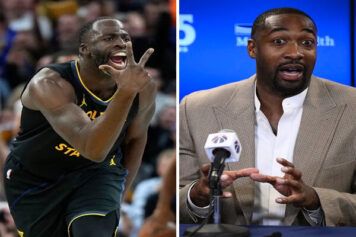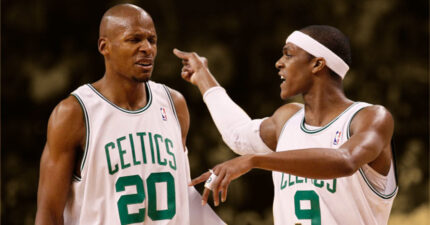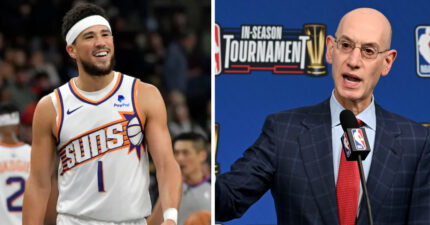The NBA is a billion dollar entity with a product that is comprised of mostly black players. The NHL and MLB are predominantly white. How come the NBA is the only league in which those players are forced through a rigid pipeline that flows through the collegiate ranks with no reputable minor league to use as a stepping stone, and has an age limit on when those players can start getting rich beyond their wildest dreams?
The NBPA has been adamantly against any sort of age minimum. The league previously allowed players to declare directly out of high school, but the rule was changed in 2005, when any high school baller with some ups and a national ranking was like, F*ck it, Im ready for The A.
Currently, it’s 19, which requires players to go to college or make other arrangements for a year after high school. NBA commissioner Adam Silver is on record saying the league wants to raise that number to 20. Current NBPA head Michele Roberts is on record saying she’s “completely against” raising it further. During a recent sports law conference, NBPA general counsel Gary Kohlman suggested the age limit even in its current form is un-American.
“Capitalism means that if you’re 17, 18 years old and you’re a geek and you want to drop out of college and invent Apple or something else, you can do it,” Kohlman said. “In this country you can do that. And there’s nothing stopping you from doing it. If you’re an unbelievable blues singer at 17, 18, 19 years old, you can go out and make a fortune.”
Kohlman went in, focusing on the obvious disparities in the limited flexibility in career choices allowed high school players in predominantly black sports as compared to players in white-dominated pro sports.
“If they were white and hockey players they would be out there playing. If they were white and baseball players they would be out there playing,” Kohlman said. “Because most of them are actually African-American and are in a sport and precluded from doing it, they have to go into this absurd world of playing for one year.
“That’s just total complete hypocrisy.”
Its no secret some NBA players were unhappy with the ultimate results following the lockout of 2011 because in February 2013, Billy Hunter was ousted unanimously as executive director of the National Basketball Players Association amid charges of nepotism and other concerns. Seventeen months later on July 29, 2014, Roberts, a Washington D.C. lawyer, was elected as the new H.N.I.C. She became the first woman to head a major professional sports union in North America.
Roberts has come out swinging. The age issue and Kohlman making that statement isnt only a big deal because it affects hundreds of high school student-athletes. Kohlmans words and Roberts early stance on this matter which NBA commissioner Adam Silver obviously thinks is open for debate, sets the tone for Roberts tenure as Queen Protector.
Washingtonian Magazine once called her “the finest pure trial lawyer in Washington.” So you already know shes constantly asserting herself as a powerful woman who craves confrontation and intends to impose her will on the NBA owners and the commissioner.
The next NBA collective bargaining agreement is almost certain to result in another lockout, because Roberts has clearly drawn the lines, and she has let it be known that she is uncompromisingly an advocate of the player’s interests. She intends to champion for higher salaries and a bigger cut of the TV and social media pie for players. Seems like shes hell bent on her legacy being tied to players rights and owner’s plight, which is definitely something new.
Just from a financial standpoint, expect Roberts to be true to her sterling reputation as a litigator and fight the NBA tooth and nail on raising an age-limit that most African-Americans see as biased and systematically designed to limit black success. Its the opposite of capitalism and forces high school ballers to stay in college for two seasons or go overseas until they can be drafted in the states.
To the NBAs credit, part of the reason they instituted the rule in the first place was to stop the flood of young, impressionable players getting influenced by money-hungry agents who overestimate their talents and make these kids surrender their amateur status without the proper information to make an informed decision.
The NBA maintains that the rule wasnt intended to stop gems like Kobe Bryant and Kevin Garnett, Tyson Chandler or Moses Malone from traveling their road to the riches, but they didnt want it to become the norm. You cant have kids running a mans game.
Racially biased as people think it is, said ESPNs Scoop Jackson on a special First Take panel that included Chris Broussard and the omniscient Freddie Coleman, in this climate I dont think Adam Silver is going to let it go away. The fight is whether they are going to up it to 20 or not.
While Jackson doesnt necessarily agree with the age-limit he sees some positive aspects to it and says players jumping from high school to the NBA hurt the financial powerhouse that is college basketball in that the fan connection and familiarity with the college players usually makes marketing that player much easier at the pro level.
Said Scoop: Part of the reason they have the age limit is because college basketball is suffering from the kids who are (one-and-done).
Indeed, when all of the best players go right to college from high school or attempt to do so and failthe college game loses some of its luster and its reputation as the breeding ground for future NBA superstars.
The panel was a heated one, which gives you some insight on how flammable and multi-faceted the topic of age-eligibility is and the kind of colossal battle Roberts, the NBPA and The Commish will engage in.
What the league is trying to do is help the kid, said Broussard. So if he comes out and hes not draftedhe doesnt screw his eligibility up.
Coleman is vehemently against it. He feels that being able to make choices is part of life and living in a free society. Most of these rules are cloaked in doing whats best for the poor black kid, but Coleman says, You have to deal with the consequences and repercussions that come with making (those kinds of decisions to leave high school and go pro).
Coleman feels that African-American kids should be able to make the same decisions that any white kid can, and they should be able to adjust and switch careers if need be, as long as the NBA provides them with realistic information about their draft expectations.
Too many African-American kids have been told this (making it to pros) is what youre going to be good at or its their only chance to be somebody, said Coleman… “A lot of black kids dont come from affluent backgrounds so people tell them this is all your future is going to be.
Chris Broussard says the NBA should strengthen the D-League — financially and talent-wise — giving kids who arent ready for The League something to fall back on, instead of sending them out into the streets to fend for themselves because they didnt make the NBA.
At the end of the day, this is America and everybody has an opinion. Half of this issue is driven by the greed and the unrealistic, money-driven expectations of agents, players, their families and fans. The other half is driven by big business and people who dont trust that the NBA has its majority-black player base in mind when concocting these rules.
One thing for sure is that Roberts isnt going to make a back room deal and look her constituency in the face and tell them to fall back. Its full steam ahead and as she pushes the envelope for players rights and compensation, the NBA will have to play a different brand of ball.



